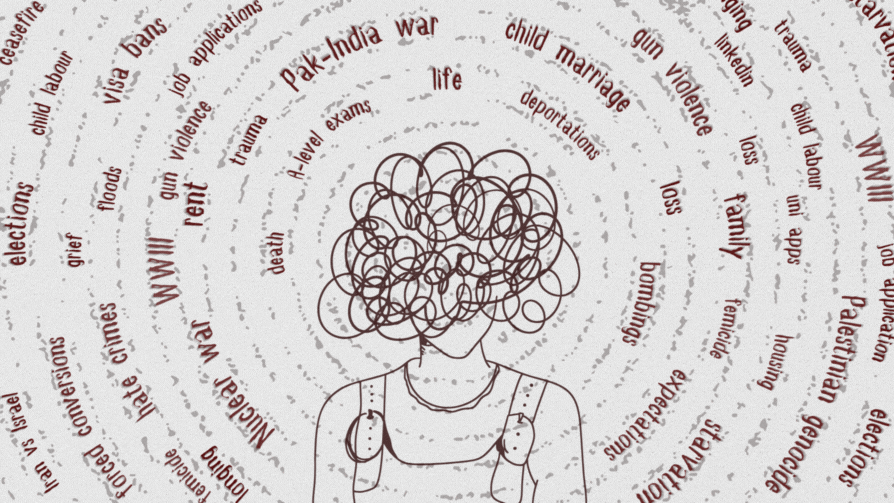Both Sit In Silence For A While goes global: In coversation with Ali Junejo and Rasti Farooq
When good theatre comes around for Pakistanis in a nation where the art form is witnessing a decline, it’s cause for celebration, as was the case two years ago when Ali Junejo and Rasti Farooq — known from the acclaimed film Joyland — introduced their dark comedy play Both Sit In Silence For A While in Karachi, Lahore, and Islamabad.
Considerable attention surrounded the play, inspired by absurdist writings. Both Sit In Silence For A While has now surpassed its national confines and is being staged in Dutch in the Netherlands. After having connected deeply with local audiences, this Pakistani production has now found a new audience over 5,000km away.
“After tremendous success in Pakistan, we’re bringing this piece to Europe for the first time!” proclaimed Studio Antigone — a Dutch theatre production company. The play will have six shows at various venues across the Netherlands until February 9, directed in its translated version by Agaath Witteman, titled They Sit And Say Nothing for A Moment (Dutch to English translation).
Junejo and Farooq sat down for a conversation with Images and shared their excitement over this development.

Junejo — who wrote, directed, co-produced, and acted in the original play — was overjoyed upon learning of the foreign agency’s interest in acquiring the rights to his brainchild. This was his first solo-written play and his third overall.
He was in the company of Farooq, his co-star in the two-hander when they received the news.
“I was like ‘that’s not possible, no, this is a joke. There is no way somebody would [want to] do this. This is a prank or a con of some sort,” the actor-director recalled.
He feels “weird” because, on one hand, he is “thrilled and excited,” but he is also experiencing “a bit of an imposter syndrome.” “Because I am a nobody,” the humble writer said, to which we disagreed, of course. Not only was his play able to deeply connect with the Pakistani audience while it ran, but Junejo has also become well-known after starring in Joyland.
“I appreciate your kindness, but… But, that’s how it, you know, how it felt for me,” he added.

Both Sit In Silence For A While explores the dynamics between a warring couple, played by Junejo and Farooq.
“The play was about things that are universally human, relationships and marriage and the ability of people to communicate, the things that bring people together, the things people do to each other out of care, and how sometimes they leave themselves behind out of care for somebody else,” the director explained.
“So I feel like that would reach out to people, generally speaking. […] That’s what ended up happening,” he said.
“I think that it’s a universal concept. Just the idea of marriage and people and love and relationships and so on and these things. I think that these things are everywhere,” he added.
After the realisation hit that his play was indeed transcending borders, his only hope for his creation was that “it would retain its humour”. “Because a lot of the things in the play are meant to be funny and they’re absurdly funny. They’re obviously a bit dark and all that, but they’re absurdly funny,” Junejo explained. “And my only hope was that everybody gets the joke.”
Speaking of the changes made to the original play for the European adaptation, he clarified that the sole requirement for the Dutch producers was the translation into Dutch. “It was completely up to them how they wanted to translate it once they got the rights to it.” He simply hoped things weren’t “lost in translation.”

“If it gains momentum and if people enjoy reading it and they want to perform it, I am happy to get it into as many languages as they want.” Additionally, he expressed a desire to translate it into Urdu and perform it.
Farooq also shared her perspective with Images regarding the Dutch adaptation. Reflecting on local performances, she found it intriguing that despite a mostly similar audience background, each viewer interpreted the play differently. “Largely more or less [people of] the same kind of background were watching this play, and interpreting it so differently,” she said.
“The characters’ physicality was very important to our performance. At what times, how do they face off against one another? Where are they standing? How do they move? And so it’s really interesting to see how, in this Dutch production, we hadn’t told them about any of this.
“They hadn’t seen how the play had been done here. They didn’t have a recording. So they started afresh. And so [I was] curious to see how they’ve designed the set and whatever I could glean from the pictures, how they designed the physicality of this. And then even in the little review piece that we read, it was so interesting that this person was comparing this play to [Edward Albee’s] Who’s Afraid of Virginia Woolf? These connections just form inevitably,” the actor added.

Touching on the narrative of the play, she emphasised that the central theme of the play is “love”. “It’s a very tender feeling, but it’s also very — it can be a very thorny feeling. [The characters] are trying to bridge this terrible gap between them for the sake of their daughter.
“And the way that that’s been written, all that conflict is woven very intricately with people. So I was just hoping that, in the translation of it, that would also carry through,” she said, mirroring Junejo’s hopes.
She acknowledged that translations are “tricky,” stating that one can never “carry forth the same set of meanings,” and that “things change inevitably.”
The warring couple in the play want to get a divorce and the conflict lies in their refusal to take custody of their daughter afterwards. The wife is too busy, and the husband is too depressed. “The dynamics in the play are fairly simple. There is a couple, and they have agreed that they’re going to separate. They’re not going to be together,” Junejo explained.
“And that’s an age-old issue that exists between people.”

“They both make complete sense to me, and they are both also at the same time completely wrong about how they’re doing all of this and how they’re navigating this space,” explained Junejo.
Eventually, the two decide to give their daughter up for adoption. “Typically, you’d see an argument where the mother says the daughter should stay with me and at the same time, the father is saying, no, she should stay with me.
“But over here, I wanted to just figure out and see how it would be if the father is saying, ‘no, she should stay with you,’ and the mother is saying, ‘no, she should stay with you,’” he said, subverting the audience’s expectations.
He aimed to explore how far he could “run with the idea,” finding it increasingly amusing yet tense as they delved deeper into it.
“It was really absurd what these two characters were doing to one another, and eventually, we arrived at that delicious kind of balance of painful yet tender,” Farooq added, recalling her journey of embodying the workaholic wife in the play.

The actor’s experience of working together in Joyland helped with their cohesion. They were well aware of each other’s performing techniques and methods.
“[Rasti’s] logic for approaching a scene was always studious, almost academic, but then her instinct was so strong that it would always overpower that, and she’d run with it. It’s almost like she had no idea how to control her instinct. It would just take over and then she’d just glide the scene in a way,” Junejo shared.
“I enjoyed working with that. It’s a very rare thing. People are normally concerned about where the camera is, they’re usually concerned about the light’s position, and they’re very concerned with blocking as well.”
Storytelling is universal
“Storytelling is something that I feel is completely universal. We do it at home. When we’re kids, we hear stories, we watch them. When we grow older, we tend to lie to our parents about all kinds of things and make up all kinds of stories because we have a lot of ideas,” underscored Junejo.
“Even in all the texts that we read in school, or at home, or through our parents, or films and television, and very importantly, through religion as well, we hear all these beautiful stories and we hear all these great stories of great people that have come before us, and we learn so much about morality,” he said, emphasising the universal nature of stories.
“The characters may have different names, they may speak different languages, but ultimately the sense of right and wrong, good and evil is something we experience all over the world.”
He also hopes that the stories and themes he would like to tell are universal, even if they’re presented in a local context. “The stories I would like to think and write about or be a part of, hopefully, in some way will always be rooted in basic human ideas,” he explained.
“A good example of that is some of the recent films, whether it’s Joyland or The Legend of Maula Jatt. Sure, the language is different, but the thrill you experience while watching something like The Legend of Maula Jatt, the relatability towards characters you feel when you’re watching something like Joyland, you tend to feel it because it is a universal human thing,” he said.
These basic human ideas not only encourage him to write but also make him “feel like a human being.”

Focusing on Both Sit In Silence For A While, Farooq explained that Junejo was “very aware of the fact that he didn’t want to ground the play in anything that was distinctively and explicitly Pakistani”.
“All of that helps to make it a very universal story, which would also be because these two characters could be from just about anywhere. The married couple who is arguing about what to do with their child could be from anywhere. And that was the whole point. It was a deliberate choice on Ali’s part, as a writer, to do that. It kind of makes this text ideal for translation.”
Of course, the act of translation adds layers of meaning to the text. “Theatre probably is one of those art forms that is most frequently translated and reinterpreted and performed in a completely different context. And so, I imagine what that does is that it does add meaning.
“It does add layers of meanings to that same text. We didn’t get a chance to go to the Netherlands and watch this play and decipher all the different areas where something has changed or hasn’t and how that has transmuted the meaning of it. But I imagine that some things were lost and some things were added, which is still of so much value to me,” Farooq said.
She believes that when a story, even as unrooted in a specific context as this, travels to a different part of the world and people know it’s written by somebody else, something valuable is transpired.
“I imagine something new is birthed there, and it exists, and it’s alien because it’s from a different place. […] But now it’s also familiar because it’s been translated into your language.
“So for me, something like that is very valuable because the more layers are added to [the meaning], the richer it becomes,” she explained.
The future
Junejo is currently working on the sequel to Both Sit In Silence For A While titled Both Storm Into The Room Breathless, Enraged And Unforgiving Yet Seemingly Unaware Of Who Is Chasing Whom.
“Ridiculous title,” Junejo chuckled — but it actually is the title of the second play. The director plans to showcase both parts together, and once he is done with that, he’ll write a third one.













